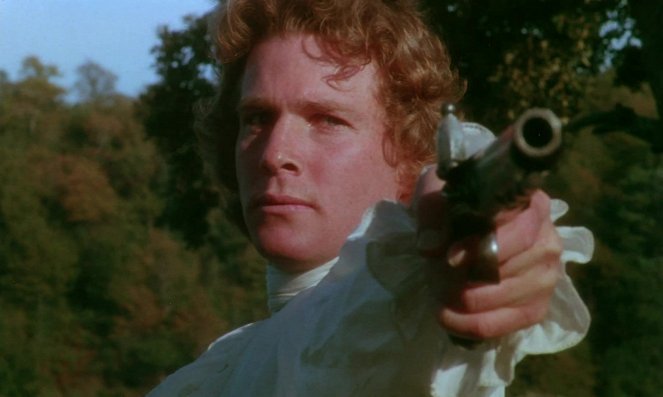Directed by:
Stanley KubrickScreenplay:
Stanley KubrickCinematography:
John AlcottComposer:
Leonard RosenmanCast:
Ryan O'Neal, Marisa Berenson, Patrick Magee, Hardy Krüger, Steven Berkoff, Diana Körner, Murray Melvin, André Morell, Philip Stone, Peter Cellier, Ferdy Mayne (more)VOD (1)
Plots(1)
How does an Irish lad without prospects become part of 18th-century English nobility? For Barry Lyndon (Ryan O'Neal) the aer is: any way he can! His climb to wealth and privilege is the enthralling focus of this sumptuous Stanley Kubrick version of William Makepeace Thackeray's novel. For this ravishing, slyly satiric winner of 4 Academy Awards, Kubrick found inspiration in the works of the era's painters. Costumes and sets were crafted in the era's designs and pioneering lenses were developed to shoot interiors and exteriors in natural light. The result is a cutting-edge movie bringing a historical period to vivid screen life like no other film before or since. (Warner Bros. AU)
(more)Videos (1)
Reviews (9)
Sometimes you're down, sometimes you're up. This saying perfectly captures the life adventures of Redmond Barry, who, starting as a poor Irish peasant, manages to ascend to the position of a noble title owner and a welcomed visitor in the households of the highest social circles. However, the means he chooses for his ascent are not exactly kosher, and hence the change of name and identity comes in handy. It is often said that you reap what you sow. Stanley Kubrick was known for his precision bordering on obsession and megalomania. He meticulously cared for every detail, had costumes and accessories made according to historical sketches, and selected locations carefully, and from the perspective of a fan of the historical genre, it is hard to find fault with him. In the case of Barry Lyndon, perhaps more so than in other Kubrick films, his ability to create visually stunning images with perfect color execution and composition shines. The panoramic shots of landscapes, estates, army camps, and battles are a feast for the eyes, just as the viewer's ears are pleased by the precise selection of music from different genres that characterizes various social environments and creates the mood. Barry Lyndon signifies the same for capturing the atmosphere of the second half of the 18th century as Amadeus does for the Rococo period and Marketa Lazarová does for the early Middle Ages. Overall impression: 95%.
()
Even though one might think that this will be an unbelievable boredom, that even Kubrick couldn't accidentally direct, the Master once again proves that this is a film that captivates. Even though it's not action-packed, you will still be on the edge of your seat, whether it's because it's entertaining, dark, intimate, and sometimes simply sexy, albeit in its own way. Those three hours will go by quite quickly.
()
A slowly unfolding, utterly unpredictable, and almost intimate story of one man who greatly influenced the fates of many people. Kubrick presents his most magnificent work cautiously, perhaps somewhat unevenly, but every, even the smallest scene, has its justification in the final outcome. Furthermore, he chose the perfect actor, Ryan O'Neal, for the main role, who showcased his acting skills the most in gradually escalating scenes of a card game or interrupted concert. The narrator, however, remains a flaw, as while filling in the gaps nicely, their guiding speeches harm the tension of the unfolding events.
()
The third time’s the charm. While it's a nice chapter in the history of film on the subject of lighting, and I'd love to read William Makepeace Thackeray's novel someday, if the scene of finding the bow in the cleavage doesn't work, there's something wrong with the film. That something is called Kubrick. Hooray! And we clap and we high-five. While we do not enjoy the realities of the 18th century, for which of course we have no understanding, we do enjoy the compositions and the anti-hero, and like monkeys, we adopt the lessons of the divine auteur who is so familiar to us.
()
Fully appreciated after a second viewing (and in the restored version in the cinema). I still feel that I would have to watch it at least twice more to clarify my uncritical enthusiasm and to come up with better superlatives than "Kubrick was just different", but I can say that you probably won't find a more beautifully filmed biography in any film archive. Kubrick not only paints the screen better than Bertolucci, but above all, with a clever helping of amusingly ironic commentary, he narrates with complete mastery, elevating a three-hour personal portrait to the highest cinematic art with every thoughtful cut or musical accompaniment, like a bubble in a spirit level maintaining the demanding rhythm of the narration. While the first two thirds are unmatched for their quicker changes of location and major twists, the final family section is not lacking in stunning formal precision, and its thoughtful denouement surpasses even the similarly paced conclusion of Gone with the Wind. And once again, I have to marvel at how fantastic the film looks and how superbly it orchestrates everything on the mise-en-scène, so that the camera mostly just needs slow zooms or horizontal runs – for example, in the card scene, it's fascinating that only one character ever looks up from the table while the others have their eyes downcast. And the icing on the cake is the excellent performance of Ryan O'Neal. Yeah, Kubrick was just different.
()



Ads